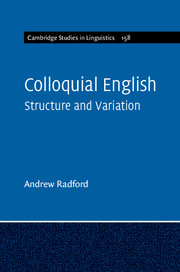Prologue
Published online by Cambridge University Press: 09 June 2018
Summary
Over the past four decades, I have produced a series of books characterising aspects of the syntax of standard English (Radford 1981, 1988, 1997a, 1997b, 2004a, 2004b, 2009a, 2009b, 2016). During that time, I have become increasingly aware (mainly from paying close attention to the language used on popular British radio and TV stations) that in colloquial English we find noncanonical structures (i.e. structures not reported in grammars of standard varieties of English) which are very different in nature from the structures found in the kind of standard English used e.g. in national newspapers or news bulletins on radio and TV. I have used occasional examples of such colloquial English structures as the basis of some of the exercise material in my syntax books, asking readers to describe how the non-canonical structures in the exercise material differ from the canonical structures described in the main text. Examples of non-canonical structures mentioned in earlier books of mine are given below (where the constituents of interest are highlighted in bold or italics):
(1) a. What a mine of useless information that I am (Sir Terry Wogan, BBC Radio 2; Radford 1988: 501)
b. Let's find out how good you are a driver (Jeremy Clarkson, BBC2 TV; Radford 2009a: 426)
c. That's the guy who I think's sister is the lead singer in a new band (Radio presenter, Top Shop, Oxford Street, London; Radford 1988: 526) d. What is thought has happened to him? (Reporter, BBC Radio 5; Radford 2004a: 429)
e. To which of these groups do you consider that you belong to? (Form issued by the Council in the town where I live; Radford 2009a: 233)
f. I hit shots that I know I can hit shots (TigerWoods, BBC Radio 5; Radford 2016: 313)
g. This information is asked for on the census-form, [which they threaten to fine you up to a thousand pounds if you don't fill the thing in] (Civil Liberty spokesman, BBC Radio 5; Radford 2016: 477)
Such structures are interesting for (at least) five different reasons.
- Type
- Chapter
- Information
- Colloquial EnglishStructure and Variation, pp. 1 - 6Publisher: Cambridge University PressPrint publication year: 2018



